Although adding fats and oils to finishing pig diets have been shown increase average daily gain and feed efficiency, impacts on carcass quality should also be considered.
1. Pigs deposit fat in the same fatty acid profile as the dietary fat. This characteristic is particularly important in grower-finisher pigs because the composition of dietary fat is a determinant of carcass fat quality. Different fatty acids have varying melting points which will affect carcass fat firmness carcass fat.
2. Diets with vegetable oils are rich in unsaturated fatty acids (which are minimally modified before deposition into fat stores) and increases the softness of carcass fat.
3. Feeding more saturated fats and oils such as beef tallow will result in firmer fat.
4. During the finisher phase, avoid feeding diets with high levels of unsaturated fatty acids which will result in the deposition of softer fat.
5. Unsaturated fats are more prone to oxidation, reducing the shelf life of the meat products and creating off-flavours and odours.
6. Feeding unsaturated fats, such as soybean, corn or canola oils, result in undesirable softer carcass fat deposited compared with more saturated fat sources, such as beef tallow or pork lard.
7. When attempting to manipulate the fatty acid profile of carcass fat, a 4-6 week feeding period is required to observe carcass fat profile changes. Fats are insoluble in water and do not solubilise in the gastrointestinal tract. The more emulsified a fat is, the more digestible it will be, and consequently the more energy it will provide to the animal.
Vitalsorb™ Pure is an emulsifying agent containing phospholipid components to support oil-in-water emulsions for the superior digestion and absorption of dietary fats and oils, particularly saturated fats.
The effect of different fats and oils on the carcass quality of finisher pigs should be considered. It is recommended to consult with professionals and tailor supplementation strategies to individual farm requirements for optimal results.





